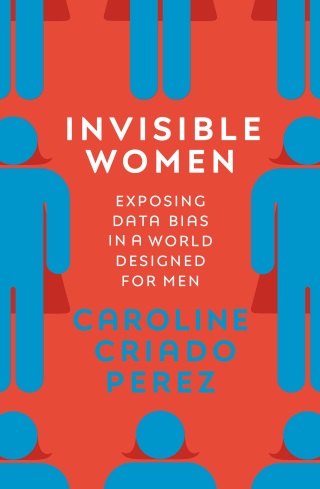Invisible Women: Exposing Data Bias in a World Designed for Men by writer, broadcaster and feminist campaigner Caroline Criado Perez, is the 2019 winner of the Royal Society Insight Investment Science Books Prize.

Imagine a world where your phone is too big for your hand, where your doctor prescribes a drug that is wrong for your body, where in a car accident you are 47% more likely to be seriously injured, where every week the countless hours of work you do are not recognised or valued. If any of this sounds familiar, chances are that you’re a woman.
Invisible Women shows us how, in a world largely built for and by men, we are systematically ignoring half the population. It exposes the gender data gap–a gap in our knowledge that is at the root of perpetual, systemic discrimination against women, and that has created a pervasive but invisible bias with a profound effect on women’s lives. From government policy and medical research, to technology, workplaces, urban planning and the media, Invisible Women reveals the biased data that excludes women.
The Guardian interviewed Caroline Criado Perez about the win.
The author and feminist campaigner who successfully pushed for Jane Austen to be featured on the UK’s £10 note, called her £25,000 win on Monday night a huge relief.
“Obviously it’s a huge honour, but mainly because it has the official endorsement of scientists and so it can’t be dismissed now, and that’s so important,” she said. “Writing this book was hellish. It really tested my mental strength to its limits, partly because it was a really emotional book to write because of the impact this is having on women’s lives and how angry and upsetting it was to keep coming across this gap in the data. But also it was very challenging because it was a book about the whole world and everything in it, and I had to work out how to synthesise that into something manageable.”
When she began writing, she said, she gave a talk at the launch of the women’s health all-party parliamentary group, during which she said “very innocuous things that are very well-known, like how women are more likely to be misdiagnosed with a heart attack, how female animals are not being included in studies, how women are having adverse drug reactions”. She received an angry response from some of the male doctors present.
“It was a real shock to me. As someone who doesn’t have a science background, I’ve always looked up to scientists as objective and rational. Even though I knew there was this bias in medical science, I thought that hearing the evidence, they would react in a ‘We need to fix this’ kind of way rather than a ‘What is this stupid woman talking about?’ kind of way,” she said. “I was really aware this book was going to ruffle feathers and I was very worried about how it would be received by people who might feel defensive about it, that I wasn’t going to be able to do justice to this incredibly important topic and that I would make a mess of it and it wouldn’t have the impact I knew it had to have.”
She is the fifth woman to win the prize in five years.
Discover more from File 770
Subscribe to get the latest posts to your email.
